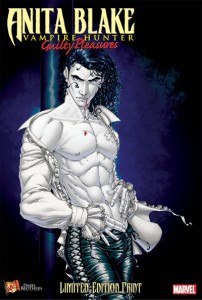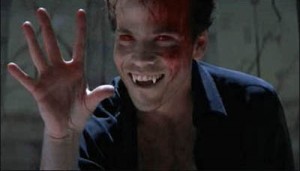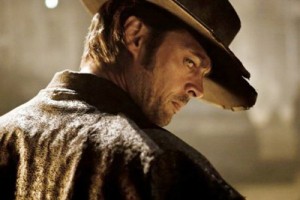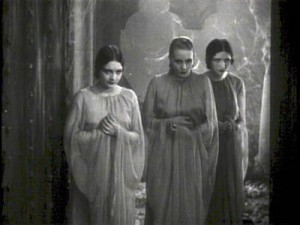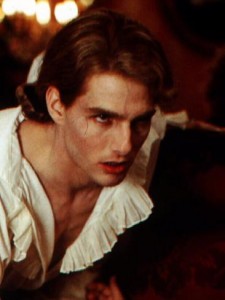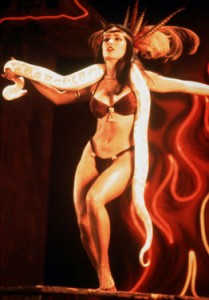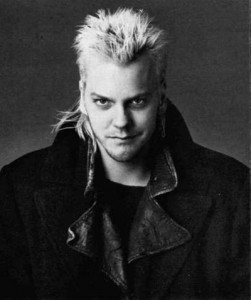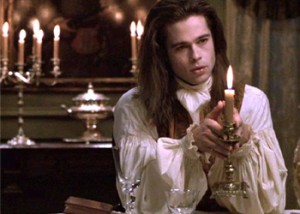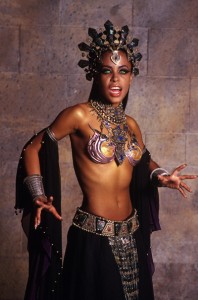Originally posted on April 22, 2011 at 12:26 PM
Maybe you’re a free-verse poet fighting the idea of testing out new forms. Intimidation, preconception, and lack of knowledge are all very real factors. Or maybe you’re not a poet at all. Maybe you see these poems and wonder how the hell anyone goes about creating them. Or maybe you’re a seasoned poet who wants to take a peek behind another poet’s bed-curtains.
Either way, you’re in the right place. In this blog, I will take you through the creation of a sonnet (the horror poem posted Wednesday: read it here first), from brainstorming, to writing, through critiques, to final product, and beyond.
Why listen to me? Not to toot my own horn, but I do know a thing or two about sonnets. I placed first in NFSPS’s Dorman John Grace Memorial Award – a national sonnet contest. Oh, and by the way – this blog post isn’t as long as it looks. Most of the text is the same thing being re-posted with slight alterations, so you can see the poem’s evolution. Let’s jump in.
Step 1- The Spark: Finding subject matter.
When I sit down to write a form poem – in this case, a Shakespearean sonnet – the first thing I need is a distinct idea. I would never sit down with a form and just start writing to see what comes out. I believe that far too many weak, meandering poems are born that way. For me, the spark must come first. Then the form.
In this particular example, the idea came in the form of a nightmare. Although I’m somewhat embarrassed by the hap-hazard scribble I’m about to post, I resisted the urge to edit it. The point is that all ideas start somewhere, and one must jot them down before they dissolve into the biosphere of Forgotten Schtuff. Bizarreness and all. This is only the end of a long and involved dream, in the effort to conserve space. Here are my jottings:
Dad gives me the car keys and tells me to go pull the car around. I look out to the parking lot and see the rows of gloomy, polished vehicles. There is a black-cloaked figure in the shadows of each one. I see ours: a dark blue van. I hold the remote car key in my right hand and a lighter in my left. I begin to walk to the car, and my dad waits by the storefront. As I near, I see a man trying to break into the driver’s side.
I call back over my shoulder, “Dad, is that a vampire?”
He hollers back, “No, it’s just a really nondescript car. Lots of people want to steal it.”
I see our maid across the parking lot, still in her ridiculous uniform, wearing a backpack, walking with my brother to the nearby highway. I can see a large, dark stain in the middle of my brother’s back. I think it might be blood. She looks back over her shoulder at me and winks. My brother never looks back.
As I approach, the man gets in behind the wheel and closes the door. I walk right up to the car, and he turns to look at me. His eyes are red: vampire. Horror pounds through me as he smiles. I know that I cannot outrun a vampire. I use my clicker-key to lock the door. He unlocks it with his long, thin fingers. I lock it. He unlocks it. I lock it again and begin backing away. This is a game to him. He thinks it’s fun. He knows he’ll win. I keep locking it and retreating as he continues to leer at me and unlock it. I jamb “lock” again with my thumb and realize I’m too far away now. The battery doesn’t reach that far.
He gets out and speeds toward me at a preternatural pace. I try to thumb on my lighter, but it’s in my left hand, and I’m right handed. He is a few feet away from me. I frantically try to light it. I can feel the skin on my thumb tearing from the effort. He has almost reached me.
Step 2- Seeing the Poem: Realizing that this idea will take the shape of poetry.
This sloppily written dream remained in my “Needs Work” folder for several years. One day, I realized that it would never be any sort of logical short story or even flash fiction in its current state. It was too strange. Too obviously a dream. And the one part of it that I really liked – the concept of the battery in the car remote running out of distance and the creepy guy being able to get out – was too short to be its own story. *light bulb* This was a poem.
As soon as I saw the poem within the idea, I wanted to act on it. The sonnet form called to me. Getting to know which forms suit which poems takes practice. Some forms are heavy on repetition, for example, and thus might not be suited to a narrative with a surprise ending, such as this. The more you work with various forms, the clearer it will become to you which ones “sing” to you, and which are suited to which types of ideas.
So I knew I wanted a sonnet. I decided that some elements of the dream didn’t bolster the core idea I so loved. My dad, brother, and the maid were minor characters and could be cut for space. The fact that the creepy guy was a vampire was irrelevant, as he never actually drinks blood, shows fangs, or uses powers. The lighter was a nice touch, but I knew it was too much to squeeze into a 14-line form. (One lesson I’ve learned in my four years or so of writing and critiquing: never be afraid to change your original ideas.) So I cut it all down to this:
I don’t realize there’s a man in my car until I’m almost to the door. He is shadowy and sitting in the driver’s seat. I stare at him in shock from only a few feet away and he smiles. Panicked, I use my car remote to lock the door. The mechanical click rings through the dark, empty parking lot. He reaches up with long thin fingers and unlocks it—the sound is muted. I begin to back away as I thumb the “lock” button again. He unlocks it again from inside the car. I am speeding backwards now, stumbling on my feet. He is laughing through the silence of the car window. This is a game to him. I lock the door. He unlocks it. I lock it. He unlocks it. I lock it—but this time there is no mechanized click. I realize that I am too far away now; the battery can’t reach anymore. I glance around me. The parking lot is empty and the store is closed. I have nowhere to go, nowhere to run. With that sickening grin, he pulls up the manual lock from the inside and opens the car door.
Step 3- Building the Bones: Setting up your template and getting rhyme ideas.
At this point, I search my paragraph for potentially rhyme-able words that carry enough significance to be used in the poem. I bold and highlight them for easy reference. As you’ll see, I don’t end up using all of these, and I use several that I didn’t find at first.
I don’t realize there’s a man in my car until I’m almost to the door. He is shadowy and sitting in the driver’s seat. I stare at him in shock from only a few feet away and he smiles. Panicked, I use my car remote to lock the door. The mechanical click rings through the dark, empty parking lot. He reaches up with long thin fingers and unlocks it—the sound is muted. I begin to back away as I thumb the “lock” button again. He unlocks it again from inside the car. I am speeding backwards now, stumbling on my feet. He is laughing through the silence of the car window. This is a game to him. I lock the door. He unlocks it. I lock it. He unlocks it. I unlock it—but this time there is no mechanized click. I realize that I am too far away now; the battery can’t reach anymore. I glance around me. The parking lot is empty and the store is closed. I have nowhere to go, nowhere to run. With that sickening grin, he pulls up the manual lock from the inside and opens the car door.
Next I make my template. I usually take a couple of lines from another poem (preferably one of mine) to get my mind into the meter of the form. I put these at the top for reference. It just helps my rhythm.
Then I lay out the rhyme scheme. In poetry, rhyme scheme is traditionally signified by letters. Thus “A” lines would all rhyme with each other, “B” lines would rhyme, etc. (The G’s are indented because couplets on Shakespearean sonnets often are.)
Finally, I fill in the highlighted words from above where I think they might be useful. Here’s what it looks like:
My brother had a frog with four webbed feet—
a gift. My mother wouldn’t touch the thing,
Title
A door
B dark
A store
B park
C
D smile
C
D while
E
F
E
F
G car
G far
Step 4- Filling in Flesh: writing the words.
Writing the rough draft is a crucial stage. The most important thing, for me, is to write it quickly. Just like with prose: you are not allowed to edit as you write. Editing is what you do after you write. You’ll see below that I put “wond’ring” in because I couldn’t think of a full word that could fit there. If I had stopped and thought about it, or God forbid gone to a thesaurus, it might have put a hex on the whole poem. Power through. No excuses. Here’s my very first draft:
My mind is dreaming now about my date
ahead and wond’ring where I might have parked,
and grateful that the store was open late
I walk without a thought into the dark.
It isn’t till my car is feet away
that I look up and see the man inside.
His shadowed face, to me, seems to convey
evil intent; I’m frozen in mid-stride.
Just sitting in the driver’s seat, he grins;
I, fumbling for my car remote, press lock,
but long thin fingers gently pull it up again,
and while I thumb it down I start to walk
backwards from the stranger in my car
but I know the battery won’t reach that far.
Step 5- Becoming Presentable: fixing up the rough stuff.
Now I get to fix those parts that I knew were crap even as I wrote them. In truth, this step might become steps 5, 6, & 7, too – depending on how many drafts you go through. That’s fine. You’ll see that between step 4 and step 5 (we’ll call it 4.5) I tried yet again to smooth that last couplet. This is also usually about the time I give my poem a title. (I have to save it under something, even if the title changes later.)
Cat and Mouse
My mind is dreaming now about my date
ahead and puzzling where I might have parked,
and grateful that the store was open late,
I walk without a thought into the dark.
It isn’t till my car is feet away
that I look up and see the man inside.
His shadowed face, to me, seems to convey
evil intent; I’m frozen in mid-stride.
Just sitting in the driver’s seat, he grins;
I, fumbling for my car remote, press lock,
but long thin fingers pull it up again,
so while I thumb it down I start to walk
backwards from the stranger in my car…
the battery can only reach so far.
Step 5.5- Putting on Makeup: arguing with yourself.
Cat and Mouse
My mind is dreaming now about my date
ahead and puzzling where I might have parked,
and grateful that the store was open late,
I walk without a thought into the dark.
It isn’t till my car is feet away
that I look up and see the man inside.
His shadowed face, to me, seems to convey
evil intent; I’m frozen in mid-stride.
Just sitting in the driver’s seat, he grins;
I, fumbling for my car remote, press lock,
but long thin fingers pull it up again,
so while I thumb it down I start to walk
backwards as he mouths from within my car…
“The battery can only reach so far.”
Step 6- Getting Critique: the feedback of others is invaluable.
At this point, the poem is as good as I can get it without going insane. I take it to my trusted poetry critique group. This is what they told me:
Cat and Mouse 1
My mind is dreaming now about my date
ahead and puzzling where I might have parked,
and grateful that the store was open late,
I walk without a thought into the dark.
It isn’t till my car is feet away
that I look up and see the man inside.
His shadowed face, to me, seems to convey 2
evil intent; I’m frozen in mid-stride. 3
Just sitting in the driver’s seat, he grins;
I, fumbling for my car remote, press lock, 4
but long thin fingers pull it up again,
so while I thumb it down I start to walk
backwards as he mouths from within my car… 5 6
“The battery can only reach so far.” 7
1- The title helps the understanding of what happens in the poem, but is perhaps too playful. Cat and mouse could easily be a poem about something silly. This poem is more sinister.
2- Slight variation of meter in the emphasis of “to” instead of “seems (wrenched meter)
3- “Evil” is trochaic.
4- “I” is the beginning of a trochee as well, to some readers. Or, with the comma as a beat, this line could be read to have 6 feet instead of 5.
5-6- “Backwards” is trochaic, and “from within” is a bunch of nothing.
7- “Battery” might be momentarily confusing. Car battery? No, remote battery.
*For help with terminology, refer to Poetry 101: A Crash Course on Poetic Devices.
Step 5- Evaluating & Implementing Critique: deciding what goes and what stays.
There’s no reason to be afraid of critique. It is just someone else’s opinion. You are still the writer. If they say “this sounds bad,” and you disagree, you don’t have to change it. It’s your creative project, remember? Consider, decide, and act. Here’s what I changed and didn’t change.
Cat and Mouse 1
My mind is dreaming now about my date
ahead and puzzling where I might have parked,
and grateful that the store was open late,
I walk without a thought into the dark.
It isn’t till my car is feet away
that I look up and see the man inside.
His shadowed face, to me, seems to convey 2
evil intent; I’m frozen in mid-stride. 3
Just sitting in the driver’s seat, he grins;
I, fumbling for my car remote, press lock, 4
but long thin fingers pull it up again,
so while I thumb it down I start to walk
backwards as he mouths from within my car… 5 6
“The battery can only reach so far.” 7
1- I agreed completely, and in fact went into it saying, “I’m still not sure about this title.” Full disclosure is always best. They agreed, confirming my instinct, and I changed it.
2- I decided that I’m okay with this one. I’m not a purist. This poem might be disqualified form a strictly-judged sonnet contest, but I’m okay with that. Even Milton and Frost didn’t live and die by the regularity of their meter. Who am I to quibble?
3- Same as above. In fact, I like that “evil” throws off the beat. It has meaning to the poem that this word should disrupt the simplicity of the verse above it.
4- I actually like this confusion, as it occurs around “fumbling,” which is representative of the meter there. In cases such as these, form informs meaning.
5-6- This line is a mess. I felt that instinctively, as you can see in my several attempts at rewriting it. I knew I wanted it to end on “car,” but the meter was too irregular to be intentional. I allowed myself to let go of and change words, and it became much easier.
7- I agreed that “battery” might be misleading, but I had to keep the meter, and I didn’t want to repeat the word “car” since the last line ended with it. One of my critique partners suggested “fob remote,” but a quick survey on Facebook showed that about 50% of every-men don’t instantly know what that is (including me). The last thing I want is to leave my readers puzzling on the last line with a vague image/word they have to look up. So I went with “key remote.”
Step 6- Show Worthy: sit back and admire your work.
You can see the changes/not changes I implemented below. This is also where I decided that the indention of the couplet didn’t serve my poem.
Scarcely Caged
My mind is dreaming now about my date
ahead and puzzling where I might have parked,
and grateful that the store was open late,
I walk without a thought into the dark.
It isn’t till my car is feet away
that I look up and see the man inside.
His shadowed face, to me, seems to convey
evil intent; I’m frozen in mid-stride.
Just sitting in the driver’s seat, he grins;
I, fumbling for my car remote, press lock,
but long thin fingers pull it up again,
so while I thumb it down I start to walk
away. He’s caught, but mouths from in my car:
“The key remote can only reach so far.”
A few things I’d like to note here, for those who are interested. This poem is (primarily) iambic pentameter. Lines 1, 7, and 12 employ enjambment. The rest of the lines are end-stopped. If read (in my opinion) incorrectly, line 7 could become wrenched meter; if read correctly (in my opinion) it breaks the iambic pattern. Want to know what all of this means? Refer to my post about poetic devices.
Step 7- Share: give it to your friends, read it at the open mic, and/or seek publication.
Not everyone shares my goals of publication. That’s perfectly fine. But I will admit that if you’ve spent so much effort on a poem… I can’t understand why you wouldn’t want to share it with someone.
The fate of this particular poem is up for grabs, as most places consider posting on blogs “publication.” Contests almost always do, so I can’t enter any of those, which, honestly, isn’t that big of a loss. Most sonnet contests are biased against horror subject matter, and most horror contests are biased against traditional forms. So if I find a venue that accepts previously published horror sonnets (lol) I might get it published as a stand-alone. Otherwise it will have to wait until my horror collection Around Dark Corners gets published. You see what I sacrifice for you guys?!
If you decide to give my method a try, I’d love to hear how it turns out! Happy poem-building!

